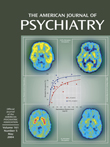Obstetric Adversity and Age at First Presentation With Schizophrenia: Evidence of a Dose-Response Relationship
Abstract
OBJECTIVE: The purpose of the study was to determine if a dose-response relationship exists between obstetric adversity and age at first presentation with schizophrenia. METHOD: The Dublin Psychiatric Case Register was used to identify subjects with schizophrenia. Data on obstetric complications, social class of origin, and family history of psychiatric illness were obtained for those subjects. RESULTS: A total of 409 patients with ICD-9 schizophrenia were identified. Patients with a history of obstetric complications presented earlier to psychiatric services. As the number of complications increased, the mean age at first presentation decreased. This effect was independent of social class of origin and family history of psychiatric illness. CONCLUSIONS: Obstetric adversity exerts an independent influence on the age at first presentation with schizophrenia, in a dose-response manner. This finding supports the existence of a causal relationship between obstetric adversity and age at first presentation with schizophrenia.



